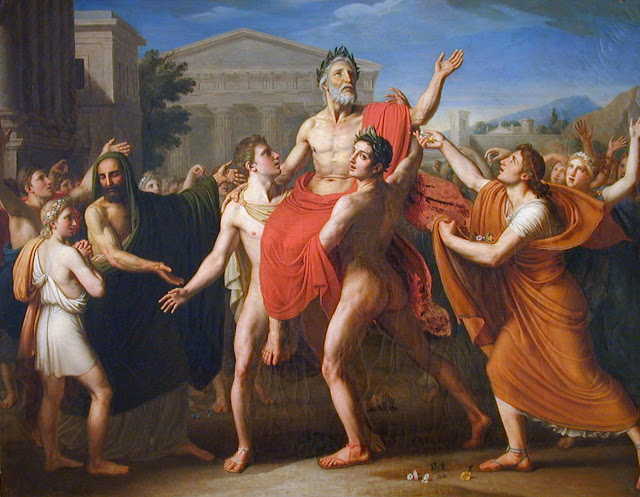Boxing fans all have their favoured fighters. We follow them and cheer them on. Often they become stars transcending the sport itself. Contemporaries may think of the likes of Muhammad Ali and Tyson Fury. But even the Ancients had their pugilist heroes. This is the story of Diagoras of Rhodes.
Ancient Greek society was deeply submerged in mythology. The mythical origins of boxing reach back to none other than the god Apollo. Hence, it is unsurprising that the highly successful boxer, Diagoras of Rhodes, was rumoured to hail from divine ancestry with the god Hermes being his father. In fact, Diagoras father was Damagetus, king of Ialysus.
PINDAR’S PRAISE
Diagoras stood as victor in all of the major games available to him to compete in. We know this from Pindar’s Olympian Odes. In the seventh ode, Pindar writes about Diagoras winning the Olympic Games twice, the Isthmian games four times, and the Nemean games ‘again and again.’ Diagoras is described by Pindar as a ‘straight-fighting, tremendous man who had himself crowned beside the Alpheus and near Castalia, as a recompense for his boxing.’
Pindar’s hymn of praise includes a prayer directed to Zeus, asking for the good fortune of the Olympian athlete: ‘Father Zeus, you who rule over the ridges of Atabyrium, grant honor to the hymn ordained in praise of an Olympian victor, and to the man who has found excellence as a boxer, and grant to him honoured grace in the eyes of both citizens and strangers. For he walks a straight course on a road that hates arrogance, knowing clearly the sound prophetic wisdom of his good ancestors.’
SPORT AND VIRTUE
The ode points to a common Greek conception of the world. It was not enough to be a good athlete. It is made clear that Diagoras was a man of virtue, who ‘hates arrogance,’ and who honours his ancestors and the legacy they fought for. In Ancient thought, the body and soul were distinct, yet intimately intertwined. Diagoras lived in the 5th Century BC, making him a near contemporary of Plato, who himself competed in wrestling in the Isthmian games to great success. For Plato, we are defined more by our soul than our body, but the body is an essential component of being human. Hence, to only be concerned with perfecting the virtues – which might be called qualities of the soul – would be to ignore the complete human being. We are embodied beings, and as such, the body must also be exercised and disciplined. For the Greeks, martial arts was one such means of perfecting the body.
Diagoras fathered several sons, all of which carried on the ‘prophetic wisdom of his good ancestors.’ They also competed in the Greek games, his son Damagetus winning the Olympic crown in pankration and his other son Akousilaos winning the boxing title. The cover image of this article depicts these sons carrying Diagoras, while a crowd cheers them on. His third son, Dorieus, also won Olympic glory three times, and several other times in both the Isthmian and Nemean games.
The feat Diagoras accomplished was not only personal, but generational. His family won great fame in Greek combat sports, winning heroic status amongst their people in Rhodes. The airport of Rhodes is named after this pugilist, as is a sports stadium in the city. Diagoras was an early boxing celebrity, who also showed us that the fame of an athlete is tied to the strength of his character.
Lyssna på det senaste avsnittet av Fighterpodden!

Kommentarer